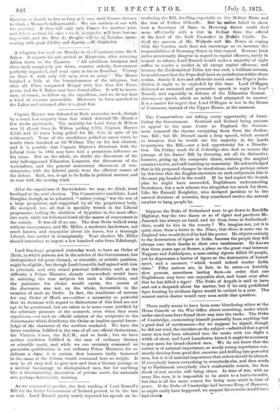Lord Stanhope proposed yesterday week to have an Order of
Merit, to which persons not in the service of the Government, but distinguished for great literary, or scientific, or artistic qualities, might be eligible ; but though Lord Granville half agreed with him in principle, and only raised practical difficulties, such as the difficulty a Prime Minister, already overworked, would have in selecting the true subjects for such a distinction, and the jealousies his choice would excite, the course of the discussion was not, on the whole, favourable to the creation of such an Order. In fact, the conditions of success for any Order of Merit are—either a monarchy so powerful that its decisions with regard to distinctions of this kind are not apt to be questioned, but are taken as in some sense justified, by the arbitrary pleasure of the monarch, even when they seem capricious,—or such an official relation of the recipients to the Government which distributes the Order as implies special know- ledge of the character of the services rendered. We have the latter condition fulfilled in the case of all our official distinctions, the Victoria Cross, the K.C.B., and so forth ; but we have neither condition fulfilled in the case of ordinary literary or scientific merit, and while we can certainly command no particular qualification in our ordinary Prime Ministers for so delicate a duty, it is certain that honours badly bestowed in the name of the Crown would command here no weight. It may be all very well to give now and then a literary peerage or a medical baronetage to distinguished men, but for anything like a discriminating decoration of private merit, the materials are, perhaps fortunately, wanting.


































 Previous page
Previous page